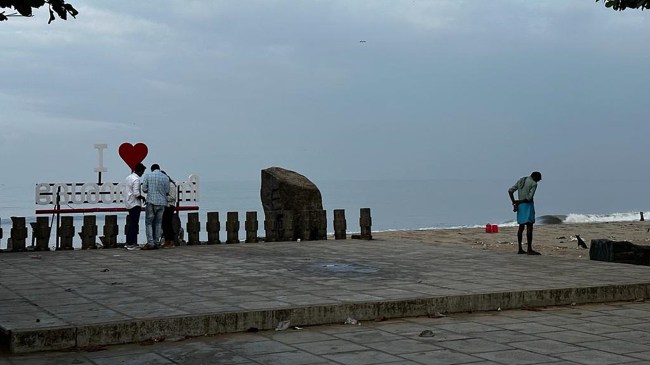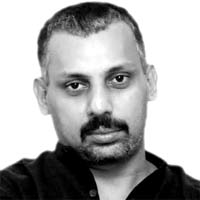Opinion Anees Salim on why Kozhikode is a city of stories
What the home of Vaikom Muhammad Basheer, M T Vasudevan Nair and other literary luminaries taught a young writer
 A few days after my 16th birthday, the newspapers carried an article about a Japanese sailor who had come to Kozhikode to get a schooner built, on which he would rediscover the Silk Route. (Express Photo: Nandagopal Rajan)
A few days after my 16th birthday, the newspapers carried an article about a Japanese sailor who had come to Kozhikode to get a schooner built, on which he would rediscover the Silk Route. (Express Photo: Nandagopal Rajan) When I heard Kozhikode had earned the title of the City of Literature from UNESCO, I remembered the day I walked its streets for the first time, laden with the hope of becoming a writer. The first city I ran away to was Kozhikode. I had just dropped out of school to become a writer and I had two reasons to choose Kozhikode as the springboard for my literary career. One was a backup plan if the other failed, and in hindsight, each looks as inanely immature as the other.
A few days after my 16th birthday, the newspapers carried an article about a Japanese sailor who had come to Kozhikode to get a schooner built, on which he would rediscover the Silk Route. The moment I finished reading the article I knew there was something in it for me, the seed of a story or a whole travelogue. And I wanted to be a part of that voyage at any cost. The second reason was a legend in literature, Vaikom Muhammed Basheer, whose books were the prized possession of our home library and who occasionally wrote warm, personal letters to my father. I didn’t want to meet him for an autograph, I wanted to be taken as his protégé. He would be my guru, and his home would be my gurukul, so that I would be rubbing shoulders with giants in literature who held regular durbars in his front yard under a mangosteen tree.
Brimming with the promise of a new life, I set off for Kozhikode. I reached the sleepy city at the crack of dawn and sat waiting for the Japanese sailor outside a hotel that overlooked the sea. After several hours and many requests sent through his secretary, the sailor finally agreed to meet me. I think I lied convincingly for a 16-year-old, and told him about the magnitude of the book I was currently working on, a book that had the roaring sea as the constant backdrop and a sailor as the protagonist. I expected him to be surprised by the coincidence and welcome me to his expedition with open hands. But he laughed off my request and asked me to take the next homebound train. I took a bus, though, to my next destination, which was a small village called Beypore where the legend lived.
There were many empty chairs under the mangosteen tree to suggest that there had been a literary gathering recently, probably that very morning when I was wasting my time first with the secretary and then with the sailor. As I waited under the tree for the next door of opportunity to open wide and take me in, the silhouette of an old man appeared at the doorway and walked tiredly into the verandah, rubbing oil onto his thin arms. He looked somewhat like the caricature of one of the characters he had immortalised in ink. He stared into the front yard, evidently not seeing me, and I was overwhelmed by the fear that he would disappear through the door without saying a word and I would be left standing under the tree forever. So I quickly told him why I had come in search of him from a distant town.
If the sailor had dismissed me with a laugh, the writer simply waved me away without even a smile. And, as I was walking away, I heard his weak voice asking me my name. He pondered over my name for a moment. Maybe the fact that his son has the same name softened him up a little. He said he was too tired for a conversation and asked me to go home, probably I could come back another day and we could talk. The world seemed to have one advice for me that day — go home.
On my way to the railway station, I struck a conversation with the rickshaw driver who said there were many other writers who had made the city their home. He could take me to many if I could afford the fare. Finally, he dropped me at a newspaper office where M T Vasudevan Nair, another legend in literature, worked as the chief editor, but I didn’t go in. I didn’t have the courage to.
Feeling let down by Kozhikode, I ran away to other cities to chase stories. While I was in Lucknow, I read about the expedition of the Japanese sailor. The schooner had capsized a week after the voyage had begun and the sailor was airlifted. The memory of that day in Kozhikode came back to me again a few months later. This time I was in Hyderabad. I had called my mother and the first thing she said was “Basheer is no more.” It took me a while to understand that it was Vaikom Muhammed Basheer she was referring to. Standing in a payphone booth and watching pigeons take off from the minarets of the Charminar, I saw the silhouette of an old man appearing at the doorway, his eyes straining to see the boy standing under the mangosteen tree. He had asked me to come back another day, but that another day was not to be.
Coincidentally, the book I am currently working on is partly set in Kozhikode.
Salim is a Kochi-based author, most recently of, The Bellboy






